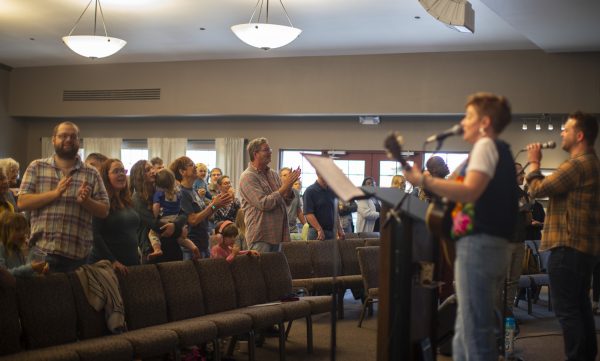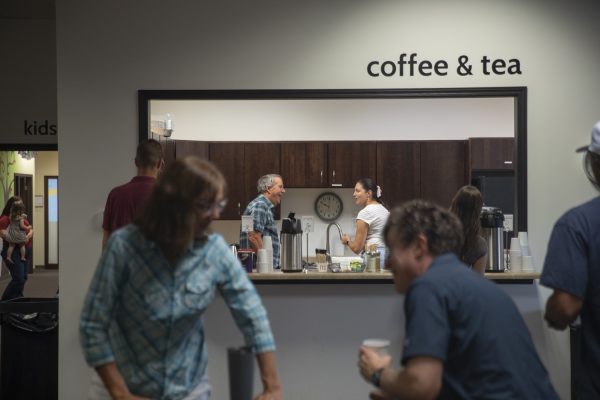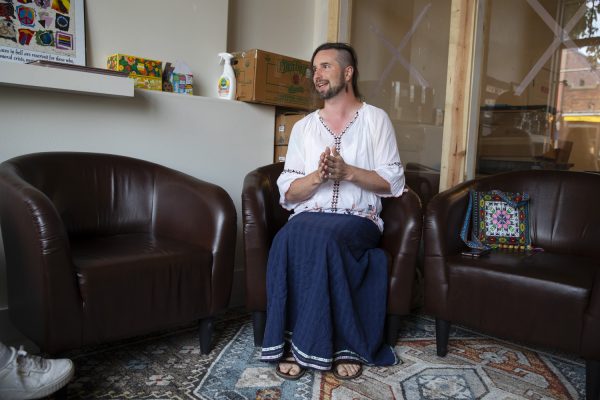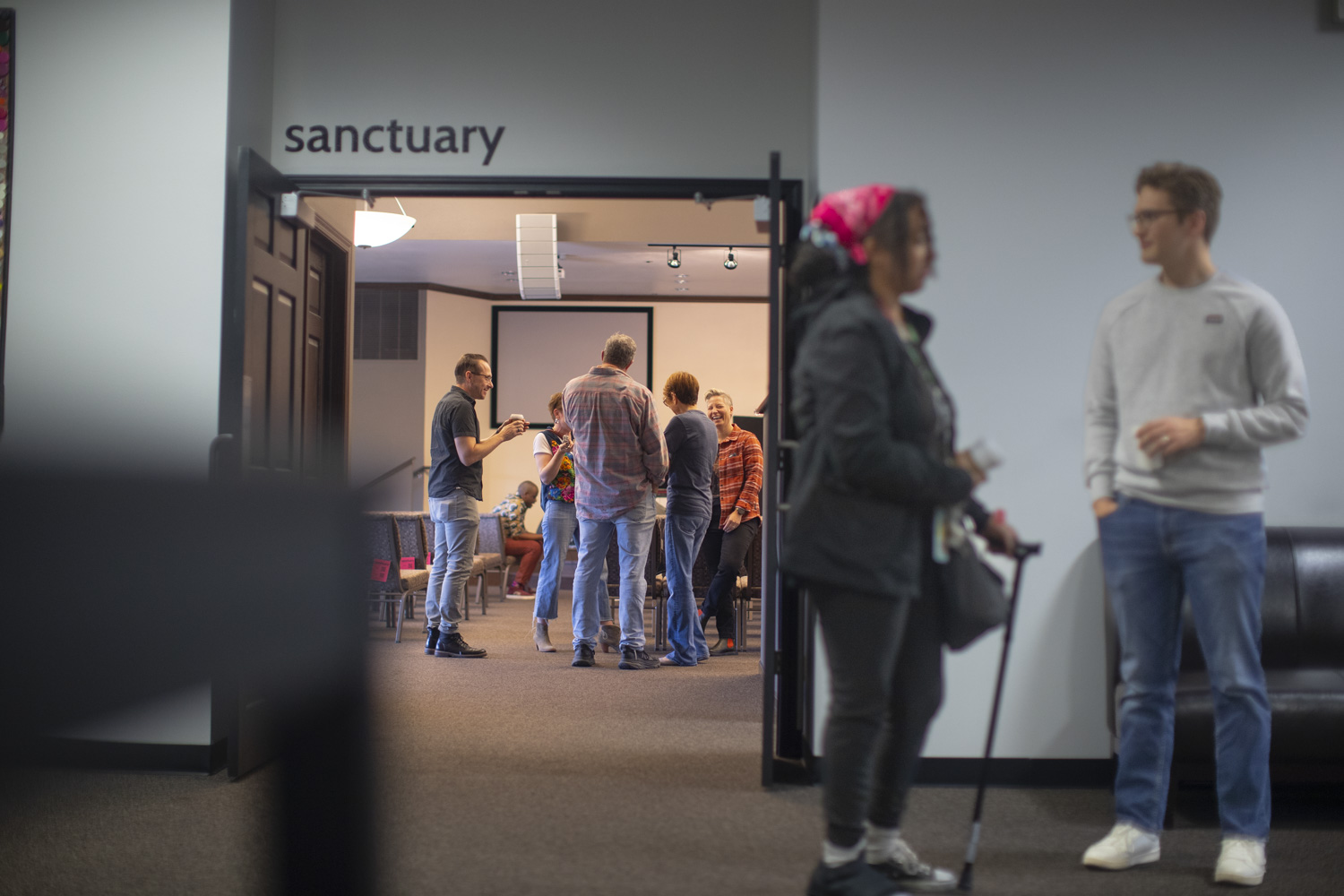Katie Imborek sat on the patio outside Deluxe Cakes and Pastries in Iowa City, her hands wrapped around a steaming teacup, the baked good she had bought for her son in a paper bag next to her. A rainbow flag hung in the bakery’s window, designating the cozy establishment as queer-friendly.
Imborek, however, is familiar with spaces that are not as welcoming.
Since leaving her religious denomination more than a decade ago, Imborek explained between sips of tea how she has been skeptical about spaces that call themselves accepting.
As a mother and a queer woman of faith, Imborek worries about how welcoming religious spaces are, especially those that may present themselves as inclusive of members of the LGBTQ+ community.
She believes it is important to question — as she has in the past — any denominational or nondenominational church’s governing belief system to gain more knowledge about all types of faith and ensure the church represents its inclusive ideologies.
She encourages her children to do the same.
“One of the first questions that I probably asked, or what most of my questions were based upon, was, ‘What are my kids going to hear?’” Imborek said of her experience in a nondenominational church.
Having grown up in a denomination in which women were largely excluded from leadership, Imborek wanted to find a space in which she could comfortably practice her faith and where her children could explore their own faith-based interests.
Imborek’s concerns as a queer woman are not unfounded. Throughout history, different denominational religions have persecuted queer individuals based on foundational teachings. Imborek represents the millions of individuals affected today who are worried about practicing their beliefs in safe and respectful spaces.
Amid their concerns, the Pew Research Center found that 28 percent of adults in the U.S. are religiously unaffiliated, a number that has grown slowly since 2020. Denominational churches everywhere are feeling the effects, especially the United Methodist Church, which has lost multiple congregations over disputes of LGBTQ+ rights.
Nondenominational growth
In the last 25 years, 40 million individuals have left denominational churches — particularly Protestant and evangelistic Catholic denominations. According to a Gallup poll, average church attendance for any religion has declined since two decades ago by 42 percent.
Many individuals step away from religion altogether. More than one in four Americans, or 27 percent, identify as religiously unaffiliated, according to the 2023 U.S. Religion Census.

Denominational churches have responded to these losses by either reaffirming their traditional policies or by moving toward more inclusive legislation.
One such church is the United Methodist Church, or UMC, which lost more than 40 percent of its four-year budget in February amid the disaffiliation of 7,673 congregations over LGBTQ+ legislation controversies.
In May, the UMC approved national changes to its 52-year policies of discrimination against the LGBTQ+ community, making marriage and ordination of clergy more accessible for queer Methodists. With over 10 million members worldwide, these changes have had massive ripple effects.
Many members of the UMC have since remained with the church, seeing these changes as a milestone for acceptance. Other members of Methodist churches across the country have left their congregations for nondenominational spaces, seeking acceptance for themselves or their peers.
In Iowa City, a mixture of emotions has caused members of several religions to reevaluate their approaches to acceptance and consider how the UMC’s decisions impact the future.
A historic shift
In late April, the United Methodist Church held its 2024 General Conference, during which the church’s lawmaking body voted to lift its ban on ministers officiating same-sex marriages and its 40-year restriction on gay clergy members becoming ministers.
On April 30, delegates of the conference, consisting of clergy and lay members elected by their respective churches, approved a document called Revised Social Principles that no longer referred to marriage as only being between a man and a woman, but rather between “two people of faith.”
Additionally, the delegates approved a measure that forbids the penalization of clergy for either performing or choosing not to perform a same-sex wedding. Two days later, delegates also approved the motion that the Revised Social Principles repeal the UMC’s previous ban on the ordination of clergy who are “self-avowed practicing homosexuals.”
This shift in policy follows decades of the UMC’s reaffirmation of its stance on banning gay clergy ministry and same-sex marriage ever since the 1972 General Conference declared homosexuality was “incompatible with Christian teaching.”
As members of the LGBTQ+ community and other Iowa congregants began to doubt the bans would ever change, they were given hope this summer when the Iowa Annual Conference of the UMC approved a vision for repealing the bans in the state.
RELATED: Local churches provide safe space for LGBTQ+ community

Despite many churches embracing the new pro-LGBTQ+ changes, many others chose the opposite route: to disaffiliate from the UMC entirely, either becoming independent institutions or joining the more conservative Global United Methodist Church.
In Iowa, the pro-LGBTQ+ changes also provoked churches to leave the denomination. As of 2023, 20 percent of Iowa Methodist churches — a total of 142 churches — have disaffiliated from the UMC.
Members of the UMC who chose to stay celebrated the vote, believing the church had finally delivered on inclusive legislation it had been promising for decades. Many local former United Methodists — those who had chosen to leave years ago when the UMC was not as open to LGBTQ+ community — are concerned, however, that these new policies do not go far enough.
A difficult decision
For Methodists who chose to leave their churches years ago because they felt their congregations weren’t practicing inclusivity, say it has been healing to find other welcoming spaces to practice their faith.
Several former Methodists have found solace in Sanctuary Community Church. Sanctuary is a nondenominational church in Coralville, Iowa, that welcomes “every race, ethnicity, age, orientation, and gender identity,” according to its website.
Started in 1999 by Senior Pastor Adey and her husband Tom Wassink, a staff pastor and psychiatrist at the University of Iowa Health Care, Sanctuary was born out of the evangelical Vineyard movement that was restrictive of queer freedoms’.
While individual Vineyard churches differ in their acceptance of the LGBTQ+ community, Adey and Tom Wassink’s former congregation “doubled down on exclusion and on forbidding freedom for queer people to live fully within themselves in the church,” Tom Wassink said.
Having grown up in such a strictly anti-inclusive environment, Adey and Tom Wassink recognize the harms of congregants feeling like they don’t belong in their spaces of worship.
“We practiced exclusion,” Tom Wassink said. “And to change isn’t just, ‘Oh, we’re going to welcome people who we formally excluded.’ You have to look at the full structure of your organization that produced the possibility of exclusion as a practice, undo that, and then build up something in its place.”
The pair left their former congregation to establish a new religious space that became Sanctuary. This was the non-denominational space that former Evangelical Lutheran Katie Imborek visited for the first time in 2011, and she has been attending services there ever since.
“It just was a much more vibrant community, right from the start,” Imborek said. “One that I really felt was more relevant to life, like one that I felt I was able to connect with the teachings, especially from having a female pastor. There was a sense of vulnerability and a real openness — a real ethos of not giving you the answers but kind of being open to questions and sort of questioning with you.”
Knowing people within their church who have been impacted by UMC policies, Adey Wassink hopes the UMC’s lifting of its bans will have positive effects moving forward.
“We’re thrilled,” Adey Wassink said. “We say it from a place of humility, but we wish it was a non-issue. It’s ridiculous that based on who you love, you should be excluded from any aspect of life.”
Husband and wife Paul and Judy McRoberts, former Methodists who now attend Sanctuary, believe the UMC has not taken accountability for its history of exclusion.
“They left churches to decide for themselves,” Judy said of the UMC Conference. “The problem is that a person can come in thinking that the church is going to be welcoming, and the church is rarely going to say, ‘Oh, no, we don’t welcome you.’”

Paul and Judy’s child Sean McRoberts also left the UMC after the 2019 General Conference reaffirmed its bans. As a gender-fluid individual, Sean was especially disappointed in the UMC’s lack of action. Sean served as an ordained pastor in several congregations before becoming a reverend in Iowa City’s Sacred Collective — formerly the Wesley Center — on North Linn Street.
Sacred Collective leadership identifies as both an independent and interdependent spiritual community hoping “to invite and partner with students to seek justice, to encounter community, and to linger in Divine truths.”
Sean was first introduced to Sacred Collective through the organization’s “not your typical Bible study” events, in which members of Sacred Collective observed and questioned passages of the Bible. This new exploration of faith from multiple perspectives drew Sean into Sacred Collective, and they joined the staff after leaving St. Mark’s United Methodist Church in Iowa City.
“[Sacred Collective] was extraordinary and really a healing space for me, as I’ve been through some pretty hard times in my leadership as I was wrestling with my identity and role as a Christian minister,” Sean said.
Open to all
While nondenominational spaces are welcoming people who may have left their respective churches over issues of inclusion, denominational spaces like St. Mark’s United Methodist Church, Coralville UMC, and the Newman Catholic Student Center maintain they embrace all people, regardless of their sexuality.
“Iowa City is a more liberal community than most of the communities in Iowa, and we already know that,” Reverend Alberta Ervin, lead pastor of St. Mark’s, said. “But I think that allows us to say, ‘We are here, we love you, we care about you.’”
Despite being unwavering in its inclusivity today, St. Mark’s has had its own history of splits around the topic and the general UMC’s stance on LGBTQ+ policies.
RELATED: United Methodist Church faces backlash from local congregations
“I’m just trying to get our feet back underneath us, so as far as our church is concerned right now, we have folks in this church that are very supportive. They go to the pride parade and social action things,” said Rev. Ervin, who joined St. Mark’s in 2023.
Coralville UMC also underwent its own inclusive changes in March of 2019, according to Rev. Rachel Lamparek, who stepped into her leadership role July 1.
Like Rev. Ervin, she views the UMC’s legislation changes as a cause for celebration.
“The church was in pain for a long time, and I do grieve the loss and the people that left, and that’s very real,” Rev. Lamparek said. “I understand that, and I sympathize with that as well. It is hard to see that happen. But the United Methodist Church has been really wrestling with this for a long time, and the inaction was causing, I think, more harm. So, I’m celebrating, and I know others are, too.”
Lamparek believes one of the drivers of the UMC’s progressivity is the influence of youth.
Younger generations, specifically Gen Z, are found to be more moderate than their older peers in both political and social views. As of 2022, one-third of Gen Z is religiously unaffiliated, and Gen Z adults are identifying as LGBTQ+ at higher rates than older generations. Coralville UMC’s decision to become inclusive was largely inspired by input from youth members of the church, Lamparek said.
“To my understanding, [Coralville UMC] had two Sundays where people could basically say whatever they needed to say and just talk about it,” she said. “And some of the youth that were there in the church stood up and talked about what this means to them, and it really impacted people, and that’s part of the reason that they decided they needed to change their official policy.”
Persisting discrimination
Not every Methodist denomination has been as accepting of inclusive legislation.
The Global Methodist Church, or GM Church, was formed in 2022 by denominations that split from the UMC to uphold a more conservative stance on inclusion. The GM Church is a “resource for all who wish to join a ‘methodical,’ practical, and warm-hearted pursuit of loving God and serving others as Jesus’ disciples in the world,” according to its website.
In a list of statements adopted from the “Transitional Book of Doctrines and Discipline,” the GM Church explicitly affirmed its stance on the LGBTQ+ community.
“We believe that human sexuality is a gift of God that is to be affirmed as it is exercised within the legal and spiritual covenant of a loving and monogamous marriage between one man and one woman,” the statement read, citing several biblical passages.
The UMC Bishops clarified the status of their relationship after the May General Conference, stating in a press release that “there is no communication taking place to negotiate a common understanding of our two bodies.”
In a statement issued on May 1 responding to the UMC’s policy changes, the GM Church made a similar distinction.
“We do not have any affiliation with [the UMC’s] decisions, nor do we wish to comment or provide commentary on the actions of other religious organizations,” the statement read.
The GM Church declined to comment despite repeated requests from The Daily Iowan.
Community in Catholicism
Though the UMC’s policy changes do not directly affect other faiths, they represent evolving attitudes toward the LGBTQ+ community in religion overall. Inclusivity of every person of faith, regardless of ethnicity or sexuality, is also an ideal of Catholicism.
The Newman Catholic Student Center, a Roman Catholic ministry in Iowa City, serves as a center of religious support for all students, faculty, and staff at the University of Iowa.
RELATED: Iowa City religious leaders help launch progressive new branch of United Methodist Church
Belger believes identifying people of worship as members of the LGBTQ+ community rather than as their individual selves can be harmful.
“It’s more of a disservice to clump people together that don’t really have a lot in common,” he said. “I mean, every one of those letters represents an individual or a group that share a common experience, but when you try to lump them all together, it isn’t a person. So, we try to meet the people, whether they come in or we go out and engage them, and we have a desire to get to know them and walk with them and meet them as individuals.”
Two years ago, the Newman Center tried to meet more people in the city with the help of the Fellowship of Catholic University Students, or FOCUS.
FOCUS is a nationwide organization that sent six student missionaries around Iowa City on behalf of the Newman Center. The missionaries visited the Pride House on Melrose to introduce the center and start building relationships with students there.
“I think it was an attempt, but there wasn’t a lot of interaction and relationship building,” Belger said. “So, far as I know, we didn’t see any of them coming over here and getting involved in some of the things that we do. So, it was an attempt that — only God knows what bridges were built, or that sort of thing.”
Despite local efforts to engage with individuals in the LGBTQ+ community, the Catholic Church’s theologies of acceptance remain relatively unwavering. The Catechism of the Catholic Church, the reference work of teachings and dogmas for all Catholic churches, takes a negative stance on same-sex orientation. It refers to “homosexual acts” as “intrinsically immoral and contrary to the natural law” and “homosexual tendencies” as “objectively disordered.”
However, the Catechism does not explicitly condemn same-sex orientation as a sin, and under the papacy of Pope Francis, the Catholic Church has become more queer-friendly.
Even though individual churches may have their own prerogatives about inclusivity, the Newman Center believes in supporting the more accepting position on the LGBTQ+ community that the pope has endorsed.
Pope Francis has explicitly stated being gay is not a crime within the Catholic Church and has called for Catholic churches to do the same, claiming such policies are “unjust.” The pope continues to assert that same-sex relations are a sin, but the Church must “distinguish between a sin and a crime.”
Though the pope’s beliefs are not fully accepting, LGBTQ+ advocates think they represent the Church moving in a more progressive direction.
Belger believes the Catholic Church’s foundational yet slowly evolving doctrine of same-sex orientation offers members of the church comfort and stability.
“I mean, there’s a reason why you came to the Catholic Church, right?” he said. “You weren’t wondering whether we were going to vote tomorrow to see if everything was going to be thrown up in the air and see where it lands. There’s something that is a great blessing for those things that move very slow and are unchanging in certain things and changing in others.”
An uncertain future
To some individuals, like Rev. Ervin of St. Mark’s, the lifting of the UMC bans seems like a step in the right direction for the LGBTQ+ community, shedding a positive light on the futures of all religious spaces.
“I think it’s going to make the church stronger,” she said. “I think as we step into this new way of thinking, new way of embracing people, it’s going to take us a while, but I think it will make us a stronger church in the sense that we profess our greatest commandments are love God and love each other.”
Paul McRoberts believes the UMC’s avoidance of fully embracing inclusivity is an effort to retain congregations.
“I think it was a big step for them to come to remove the negative language and to say, ‘You can decide,’ but I think they see a more positive statement [about inclusion] will potentially lose supportive membership,” Paul said. “I’m not real hopeful.”
Much like their parents, Sean is disappointed in the church’s lack of a positive statement on inclusion.
RELATED: Wesley Center’s openly queer pastor to resign amid church tensions
“I appreciate that the UMC lifted its bans on weddings and ordinations. At the same time, I am distressed that it explicitly allows for discrimination at the local level,” Sean said. “I’m aware of the way that, even now, the church is not acknowledging the pain that it’s caused the people who were pushed out, and lives have literally been lost over the last five decades since the prohibitions went into place.”
Sean implores people to research local churches that advocate for the LGBTQ+ community, particularly for transgender people, as anti-transgender legislation and violence are on the rise.
Thirty-five anti-trans bills are being tracked in Iowa, compared to a national 664 bills. 2022 saw the highest national rates of anti-LGBTQ+ and anti-trans crime ever recorded, and the Human Rights Campaign declared in 2023 for the first time in its history a National State of Emergency for the LGBTQ+ community.
Looking forward, Sean recognizes the UMC has a long and difficult road toward fully embracing the LGBTQ+ community. But Sean will always have hope.
“I think that any real repair requires recognition of the harm that has been done and harm that continues to be done,” Sean said. “I do believe that it is possible, but I honestly don’t expect that happening within the near future.”
Imborek’s opinions on the future fluctuate between hopefulness and a somber understanding that change is not happening because many individuals rely on their churches’ unwavering traditions.
“On good days when I’m most optimistic, I think that society is moving toward becoming more accepting and inclusive of queer people in general,” Imborek said. “On days when I’m not as optimistic, I think there’s still a lot of folks who espouse their political beliefs that are anti-LGBTQ+ have religious reasons to do so.”



